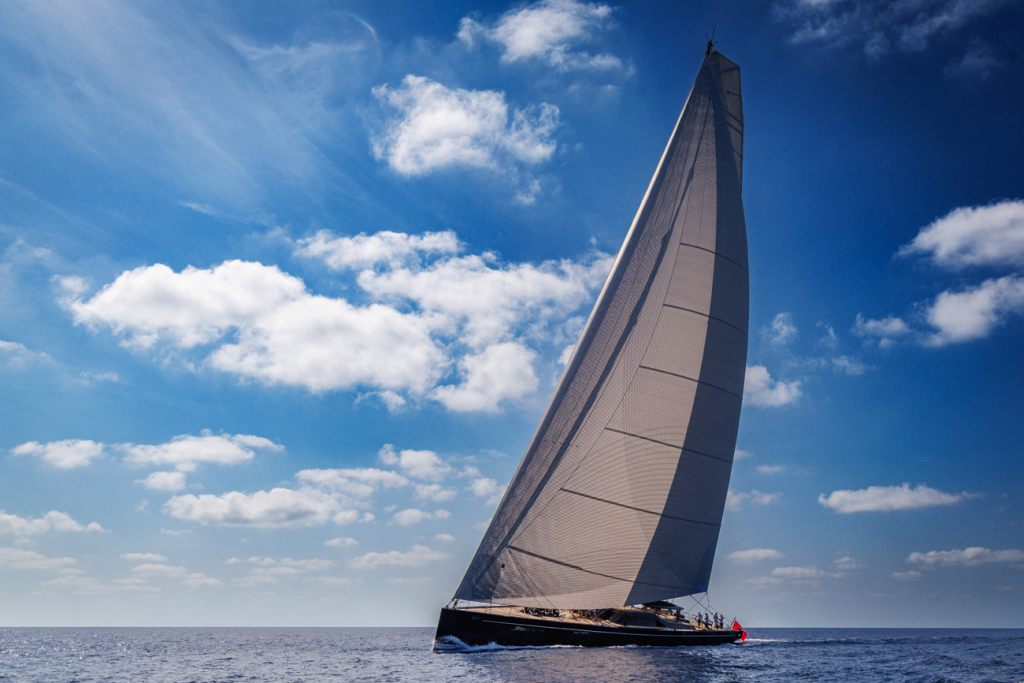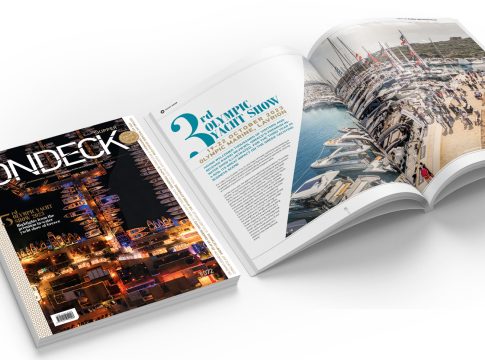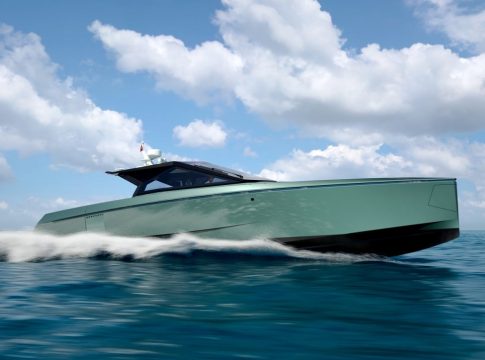The sparkling performance of the 47m Nauta and Reichel/Pugh design, masterfully built by Royal Huisman, was already evident during sea trials back in May, but the owner has since taken delivery of the yacht and started to enjoy her exceptional blend of interior comfort and sailing talent .
Nilaya sailed to Antigua, late in November after a ten days Atlantic crossing, matching all the owner’s expectations for speed, robustness, reliability and silence and with the satisfaction of her pro race team head Bouwe Bekking as well as of full-time skipper Romke Loopik.
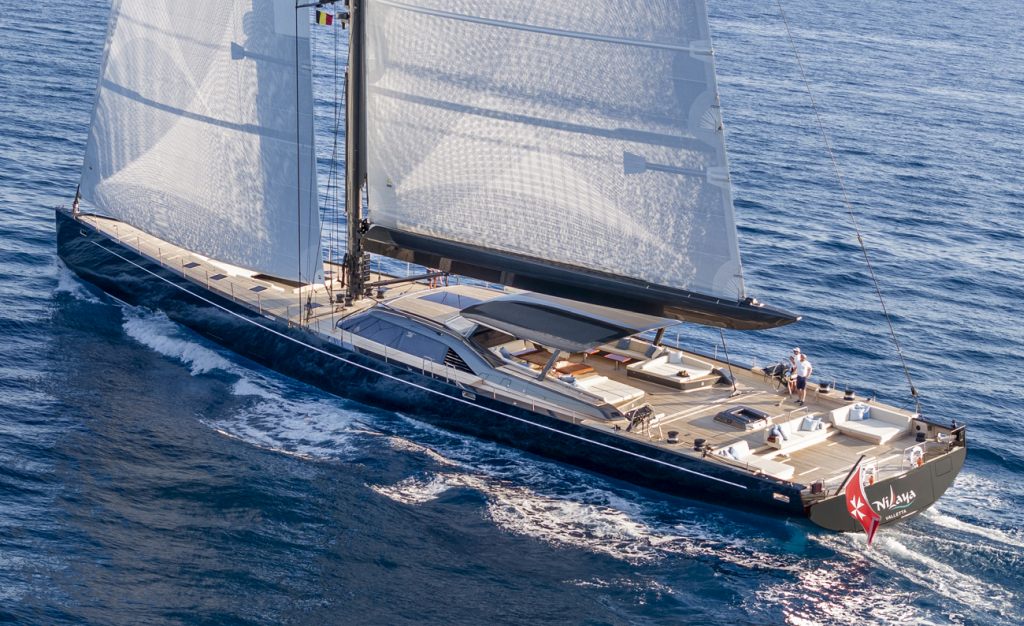
Carlo Borlenghi
Instantly recognisable for her low, modern lines and artfully concealed deckhouse, Nilaya is a yacht to excite the heart of any true yachting fan. Her proportions are carefully worked, with a modern plumb bow and a straight sheer that slides gently down to her broad, open transom. An exquisite custom carbon sloop rig gives her Panamax air draft and the potential to set an extraordinary press of sail. She is capable of effortless pace under sail, achieving 17 knots on a broad reach in just 18 knots of wind.
“Nilaya’s racy, low profile, straight bow and wide aft sections echo the look of her owner’s previous yacht while communicating even greater speed and performance,” says Mario Pedol, co-founder of Nauta Design. “She will be the world’s lightest aluminium sailing superyacht by length, rewriting the story ofhigh-performance superyachts.”
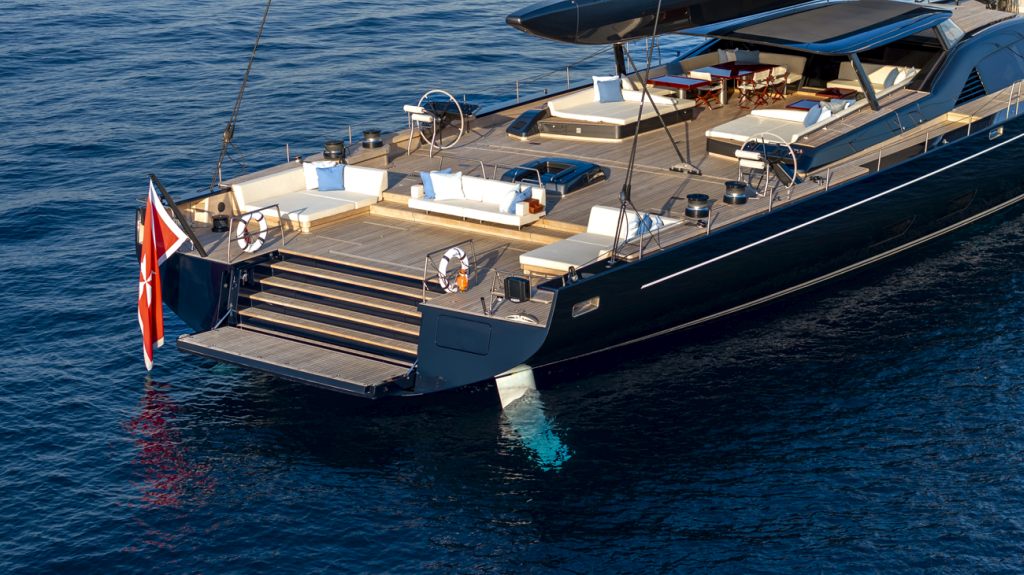
The starting point for work on this exceptional sailing boat was the experienced owner’s existing 34m yacht, also called Nilaya – meaning ‘blissful home’ in Sanskrit. When he decided to move up to a bigger yacht, he was determined not to lose the deckhouse looks and adventurous spirit. And to that end, he assembled the same key players to build the new boat – that is, Nauta Design for the general concept, the exterior and the interior design, Reichel-Pugh for the naval architecture and MCM’s Nigel Ingram as owner’s representative. The owner set them all a stiff challenge: more comfort aboard for a better quality of life with lower noise levels – all without sacrificing speed.
Reichel/Pugh Yacht Design designed and managed a Computational Fluid Dynamics (CFD) study bringing in America’s Cup CFD specialists Caponnetto Hueber and Giorgio Provinciali for the Velocity Prediction Program (VPP) performance analysis. This was a comprehensive hull design study to improve the sea-keeping and motion both motoring and sailing at various speeds and heel angles in different wave conditions, while also improving real and ORCsy rated performance.
Reichel/Pugh ultimately tested 12 models before development of the final hull shape. The VPP results indicated that in 10 knots of breeze Nilaya would sail upwind under mainsail and jib with a boat speed of almost 13 knots and nearly 18 knots when reaching at a wind angle of 90° in a 15 knot breeze.
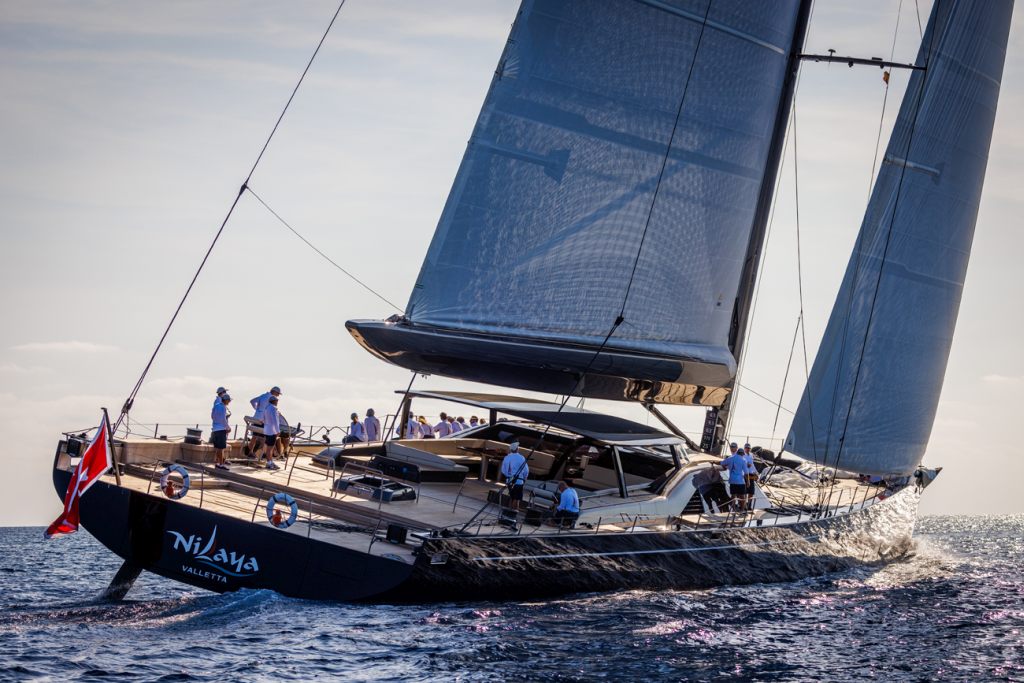
NicoMartinez for Studio Borlenghi
Lightweight carbon-fibre construction was naturally considered early on, but the design team concluded that the benefits of an aluminium build were overwhelming. For one thing, the 47m size of the boat is right at the upper limit of what makes sense to mould, while aluminium brings unbeatable robustness and quietness – valuable characteristics for a bluewater voyager.
“I started thinking that an aluminium hull weighs 60-70% more than a carbon boat, but the weight of the hull and deck is only about 15% of the total weight of a sailing yacht,” says Mario Pedol. “Our early intuition was that an aluminium construction sailing yacht could be much lighter than the existing aluminium fleet. Royal Huisman supported this vision with enthusiasm and accepted the challenging target of building a light displacement yacht.”
It was a powerful insight, and Royal Huisman was well positioned to take it on as one of the world’s leading builders of lightweight aluminium sailing yachts. The Dutch yard applied its novel Featherlight methodology adapted from spacecraft technology, and together with Nauta and Reichel-Pugh, they managed to make significant weight savings. Varying the thickness of the Alustar plates and the spacing of frames, using lightweight foam-cored panelling inside and hi-tech carbon fibre composite for the deckhouse and the guest cockpit – all these examples helped to lower Nilaya’s displacement.
With the Featherlight™ methodology, Royal Huisman made use of Finite Element Analysis (FEA), a design methodology rooted in spacecraft technology. FEA modeling is a complex mathematical geometric computation used for predicting how a part or an entire product will react under stress such as load forces.
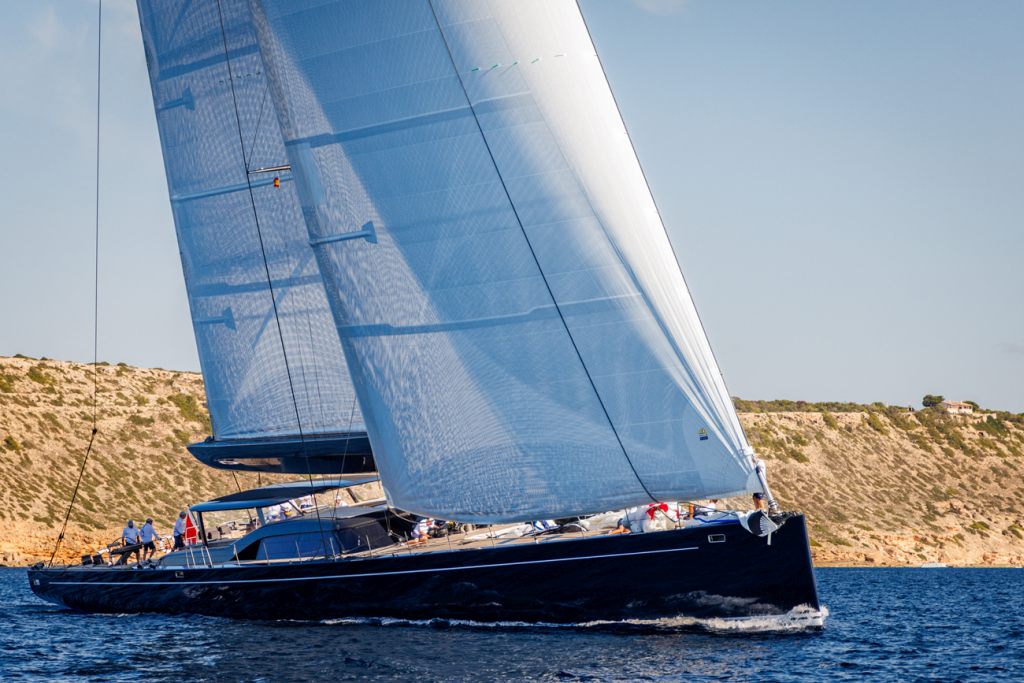
NicoMartinez for Studio Borlenghi
“The final outcome represents a new concept in aluminium construction,” explains Pedol. “Nilaya has a displacement which is 15% more than an equivalent full-carbon boat. That’s a lot less than any other comparable aluminium yacht on the water.”
Nauta has drawn on all its long experience to make Nilaya’s exterior profile as beautiful as it is pragmatic. The coachroof blends gracefully with the sheerline, while the wide stern flies above the water, showing off the hull’s double chines. Much thought went into optimising proportions to favour a coaming to protect the guest cockpit and a bulwark to protect the aft cockpit, manoeuvring area, and side passageways. “A wooden plinth between sections in composite and the teak deck makes them visually lighter, and also conceals the string lights that illuminate the deck at night,” says Massimo Gino , co founder of Nauta. “Teak inserts on the bulwarks, coamings and coachroof further enrich the deck.”
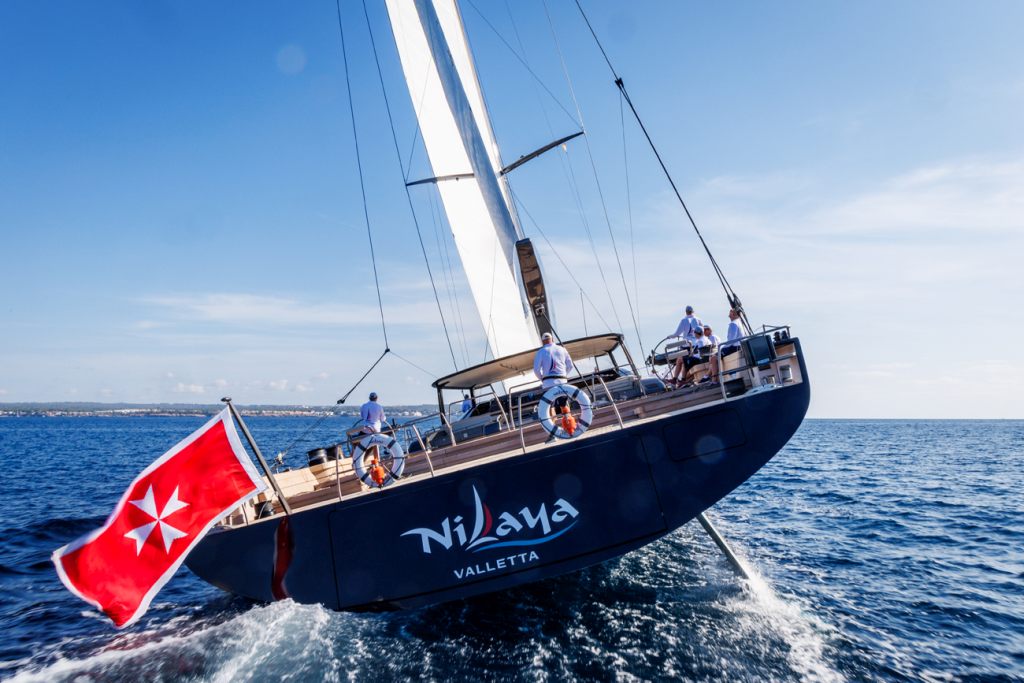
NicoMartinez for Studio Borlenghi
Exterior social spaces are legion on this yacht, and designed with a telling eye for detail. Take the main guest cockpit under the shade of the carbon hardtop. Sun loungers aft transform into chaise longues, which can be adjusted to match the heel of the yacht. There’s also a full-sized dining table for up to 14 and two further low coffee tables, all protected.
Or turn to the foredeck, where the tender is stored in a deck recess. With the tender launched or under tow, this space becomes a very cosy forward cockpit with a table and fitted cushions. At the other extremity of the boat, the almost 10m-wide transom sports a beach club, sun loungers and sofas. Here a hinged section of the aft deck folds out hydraulically to reveal a staircase down to the beach club. This in turn can be raised in order to access the crew tender in its garage aft.
Nauta’s vision reached into the aesthetics and functionality of the sailing hardware as well – nothing was ‘off the shelf’. “Our customisation of deck hardware included the styling of the 21m Rondal boom, the through-deck fittings for jib sheets, the bollards and other elements,” says Gino. “Removable gate-shaped grabrails were fitted on deck sections from the transom to the guest cockpit for the safety of crew and guests: when the gates are fitted, there are never more than two steps without a grabrail – a useful feature aboard a large yacht where walking distances, when heeled, are a consideration.”
The interior is also a matter of enormous pride, delivering the exceptional lifestyle desired by the owner, as well as the most efficient service workflow for the crew.
The Owner’s decorator, May Vervoordt, chose the materials used in the interior styling.
The interior is centred around the social hub that is the magnificent raised-deckhouse saloon, finished in a contemporary mix of contrasting woods, pale upholstery and dashes of muted blue and terracotta for sofa and cushions. Spacious dining to port and comfortable lounging to starboard both give guests sweeping 360-degree views, while a generous skylight keeps them in touch with the wind and the sails above. There’s a work area for busy guests in one corner, as well as concealed wine cooler, coffee machine, fridge and ice machine, which are ready when needed and invisible when not. Even the pantry disappears after use.
Down the steps forward and to starboard is the owner’s domain. First comes a more private lounge or TV room, then a dressing room and finally, filling the whole beam of the boat forward, the owner’s cabin. Its great volume means there is plenty of room for a king-sized double bed, L-shaped sofa and an office area, as well a separate bathroom. “The cabin was a design challenge as it lies beneath the tender bay and required careful study of volumes. The ceiling balances the tender bay’s central dip with two higher domes at the side passages giving an excellent sense of the impressive width of the cabin,” says Gino.
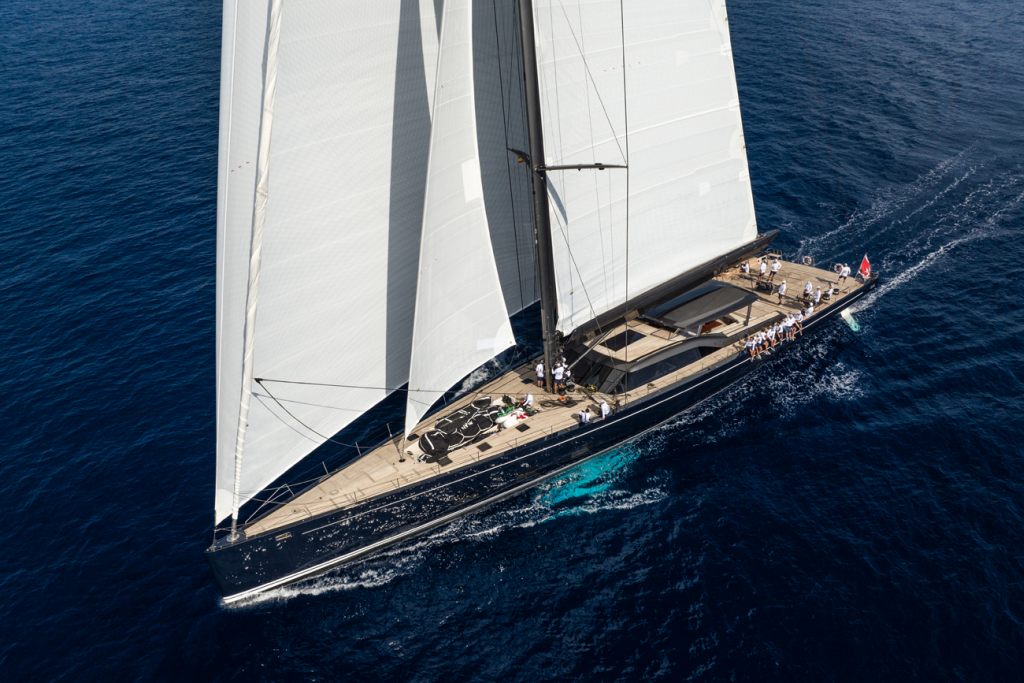 NicoMartinez for Studio Borlenghi
NicoMartinez for Studio Borlenghi
There is also a VIP cabin forward, accessed via stairs on the port side of the great keel trunk which bisects this section of the boat. Two further guest cabins with an additional Pullman are reached down an aft stairway and all can be arranged as twins or doubles, thanks to some smart sliding joinery. The aft guest lobby here also contains vertical wine coolers and a guest day head.
The crew area fills the boat’s aft section and has a dedicated companionway to the aft deck. This space is dominated by the galley to starboard and the mess to port – both generous spaces with large hull windows to bring in natural light and promote crew wellbeing. The navigator and engineer have dedicated desks on a central corridor that leads aft to the four ensuite crew cabins, made up with bunks.
“Elegant and refined materials gently blend with the natural light to create a truly cosy environment,” says Pedol. “In the crew area white lacquered surfaces are predominant, with a light use of mahogany to enrich and warm up areas such as the pantry countertops.”
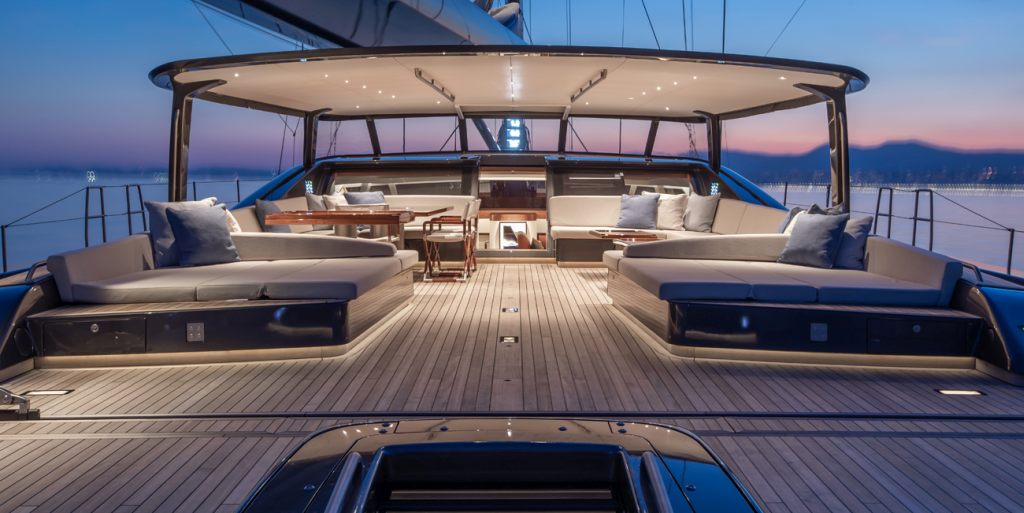
CarloBorlenghi
Nilaya is just starting out in her long career as bluewater cruiser, but it is already clear that she is an exceptional yacht. Her owner pushed for the highest quality throughout the build and he is there in every facet of her design, from that curved Rondal spreaders to the detailing of the interior. Her world-girdling programme is still under wraps, but hopes are high for an appearance at the St Barths Bucket in March 2024.



